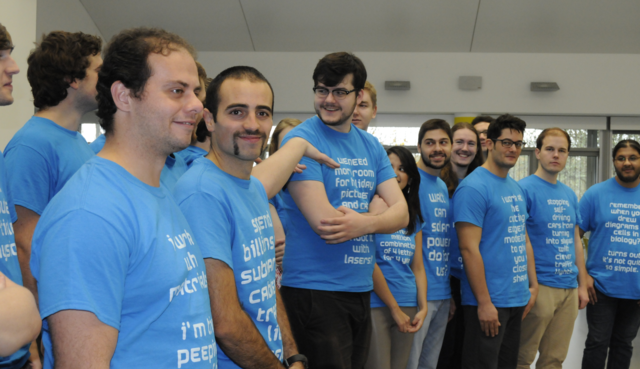NGCM PhD project titles
Skip to cohort: 2018/19 2017/18 2016/17 2015/16 2014/15

Cohort 5 – 2018/19 to 2023/24
- Adaptive Market-Making using Reinforcement Learning within a Multi-Agent System
- Machine learning of quantum mechanical lattice energies for molecular crystal structure prediction
- Simulation of Transition States for Degradation Reactions of High Energy Polymers for Safe Storage
- Understanding the Early Universe using Simulations of Lattice Quantum Field Theory
- Flexible Sheets in Turbulent Flow
- Toward an Identification of the Nature of Dark Matter with Numerical Simulations
- Statistical simulations of disordered magnetic materials
- Developing Materials Interfaces for Batteries using Large-scale Quantum Chemistry Simulations
- Using Molecular Simulations to Understand the Structure-function Relationships of Bacterial Membranes
- Applied Value Driven Design Integrated with Aero-Engine Geometry
- Computational Modelling of Nonlinear Infrasound Propagation through the Atmosphere
- Exploitation of Multi-body Dynamics for Space Mission Design
- Modelling and Data-intensive Science Methods to Understand Substorm-driven Energy Deposition into Polar Atmosphere
Cohort 4 – 2017/18 to 2022/23
- New Methods for Drug Design based on Large-scale First Principles Quantum Mechanics
- Higgs Boson Signals in b-Jet Dynamics at the Large Hadron Collider
- Novel High Performance Computing for the Simulation of Transonic/Supersonic Aerofoils with a Wavy Leading Edge
- Numerical Simulation of Electromagnetic Stabilisation of Spacecraft
- Enhancing Autonomous Guidance and Navigation with Deep Learning AI Technologies
- Efficient Overlapping-grid CFD Technique for a Self-propelled Ship
- Probing the Co-evolution of Super-massive Black Holes and their Host Galaxies via State-of-the-art, Semi-empirical, Galaxy Evolution Cosmological Models
- Simulation of Lubricant Properties for Interaction with Surfaces
- Radiative transfer modelling of accretion disk winds in Tidal Disruption Events
- Simulation of Biological Systems at Long Time and Distance Scales
Cohort 3 – 2016/17 to 2021/22
- Analysis and Modelling of Boundary-Layer Flashback Processes for Hydrogen-Rich Gas-Turbine Combustion
- Pushing the Envelope of Planetary Formation and Evolution Simulations
- Deep Optimisation
- A data-mining approach to predicting surface roughness drag in turbulent flows
- Space debris and the evolution of resilient space systems
- Next Generation Space Debris Environment Model
- Automatic Code Generation for Computational Science
- Computational modelling of underwater noise generation by turbulent fluid-structure interactions
- The use of channel wings for slow speed UAV flight
- Lattice Holographic Cosmology
- Computational modelling across ‘omic’ scales of biology
- Computational Modelling of Particle Tribocharging in Small, High-Speed Cyclones
- Fidelity optimisation in an atomic quantum computer
- Extreme non-linear optics in hollow optical fibres
- Optimisation of Acoustic Systems for Perceived Sound Quality
- Multiscale relativistic simulations
- Modelling nutrients dynamics in South-East Asia’s largest lake
Cohort 2 – 2015/16 to 2020/21
- Large scale quantum chemistry simulations of organic photovoltaics
- Efficient overlapping-grid CFD technique for a self-propelled ship
- Couple multi-scale simulation of high Reynolds number airfoil flows
- Simulations of magnetic skyrmions
- Agent-based modelling of high frequency traders
- Integrating automated vehicles into the transport network
- Multi-scale modelling of composite riser systems
- Simulation of biological systems at long length and distance scales
- Dynamics simulations for quantum feedback to steer a single particle harmonic oscillator in non-classical states
- Modelling jet dynamics and the Large Hadron Collider
- Mathematical tools for analysis of genome function, linkage and disequilibrium structure and disease gene prediction
- Dispersion of small inertial particles in characteristic atmospheric boundary layer flows
- Biomechanical optimisation of lower limb prosthetic socket design
Cohort 1 – 2014/15 to 2019/20
- Multimode simulation of high-power fibre lasers and amplifiers
- Modelling of neutron star interactions in x-ray binary systems
- Challenging topological prejudice – automated airframe layout design
- Design of unmanned air vehicles
- Uncertainty quantification and propagation through complex chains of computational models
- Computational methods for the modelling and inversion of non-linear systems and its application to beam hardening correction in x-ray computed tomography reconstruction
- Towards exascale computing in particle physics
- Variability in high pressure blade trailing edge geometry and its impact on stage capacity and blade temperature
- Multiscale models of magnetic materials at elevated temperatures
